by Kristine Bunch
The term justice-impacted can be applied to any individual that has been directly or indirectly affected by the justice system. Each person would describe his or her experience, thoughts and feelings differently. Despite this, each impacted person will say that they were affected in some way. Every individual feels the effects and struggles with the labels placed not only by society but the labels they place on themselves.
I developed an armor in prison, and I have left it on after my exoneration.
I have been described by many people as strong, driven, courageous, focused and even inspirational. These people only see the exterior. This is the armor that I wear. I found this armor in prison, put it on to protect my family and myself and I have left it on after my exoneration. Under the armor is the mark of shame. This is a wound that was inflicted when I was accused of setting a fire and killing my 3-year-old son.
The wound has never healed, and I do not think that it ever will. It does not matter that I have been exonerated or that there is evidence of actual innocence. It does not matter that my family and friends have always believed me or that so many attorneys and experts stepped up to prove my innocence. The truth is that the wound is still there, and I need the armor to make sure that I am not hurt all over again.
I have lived through experiences that my neighbors have only heard about through a television show.
I strive to be “normal” and fit into the world around me. The truth is that I may not ever achieve that feeling and I simply may not ever fit in. I have lived through experiences that my neighbors have only heard about through a television show. When I am in a social gathering, I cannot relate to what my peers are discussing. I do not know anything about setting up a retirement portfolio, dealing with mortgages or children graduating from college.
I lost 17 years of my life to my wrongful conviction and in the eight years that I have been home, I am simply trying to rebuild my life. In these social situations, I can lie and act like I know what they are talking about, or I can tell the truth and have everyone look at me like I am abnormal. At these times, I am grateful for the armor because no one can see the hurt, vulnerability or shame.

I dreamed that those lost years would have no impact on me.
Once I was exonerated, I believed everything would go back to the way it was. I dreamed that those lost years would have no impact on me. Yet, all these years later. I can still feel the pain of others labeling me as a baby killer. I can still hear the taunts. And I can feel the ridicule of the repeated strip searches before and after visits. I can still smell some of the food from prison.
The indignities that prisoners suffer strip them down and inflict serious wounds. These wounds are not healed upon release because the label follows them. The system was supposed to be set up based on rehabilitation, but no one ever seems to be rehabilitated. Guilty or innocent, your brush with the justice system will follow you the rest of your life.
The label attached to me was also attached to my family.
The shame does not belong solely to you. I recognized that my family moved to another town to escape the stigma of my arrest and conviction. The label attached to me was also attached to them. I gave birth to my son in prison, and I watched him grow up from behind those walls. I saw the armor that he put on as he made his way through school. He could not talk about his mom or where he went on weekends when he came to visit me. It was his mark of shame, and he hid it. As he grew, the wound festered and began to bleed through his armor. He felt isolated and alone.
By the time I was released, my son had tried to commit suicide. He was failing out of school and was on probation. I believed that my exoneration would lessen his shame, instead, it made him a topic of conversation and he hid deeper in the armor.
Your biggest supporters are not stronger than you; their armor is just harder to see.
My brother was my biggest supporter. He never waivered in his belief in my innocence or stopped fighting to prove it. He worked many jobs and took care of my son. His armor was harder to see. I really believed that he was just stronger than I was. Right before my release, my brother had a breakdown. The pressure of trying to take care of everything and to hide the pain of it all caught up with him.
To this day, he does not talk about the arrest, conviction or my time in prison. He will talk about the issues that I face with PTSD, adjusting to life on the outside and assisting me as I relearn everything that I missed out on. He is still my biggest supporter and has helped me to focus on rebuilding my life. Despite that, I worry about him and fear that this is still taking a toll on him.

My armor allows me to use my experience to educate others about the justice system and suggest ways that we can make the system better.
I want to help others feel the wounds inflicted by our system. People need to know that innocent men and women are accused of things that they did not do. I want to help people understand that our prisons are filled with the mentally ill, victims of abuse and addicts who need help and not incarceration. To help others recognize that not everyone in jail or prison is bad and we should not be treating them like animals. Instead, we should find ways to address the issues that need fixing. Fixing our system so that it is fair and just for all would be a great achievement.
Changing society’s views on justice impacted people would be a greater achievement. We could choose not to label justice-impacted people as exonerated, parolee, felon and so forth. Society could accept them and treat them as normal and give them a chance to reintegrate into the community without a label. To recognize that rehabilitation takes place and to give credit for it. We could have applications that do not ask about criminal history, but rather simply ask who the person is today.
Everyone makes mistakes and some mistakes merit punishment. However, no mistake should warrant labels placed on entire families. No label should follow you the rest of your life.






